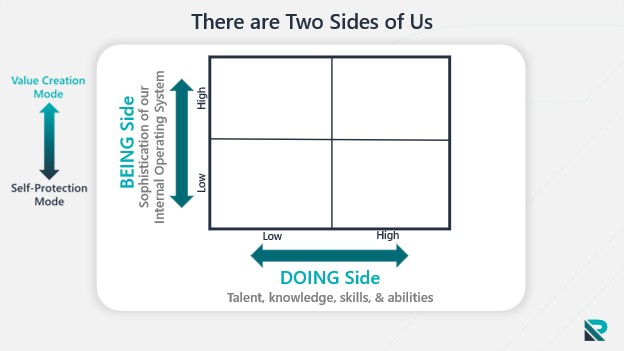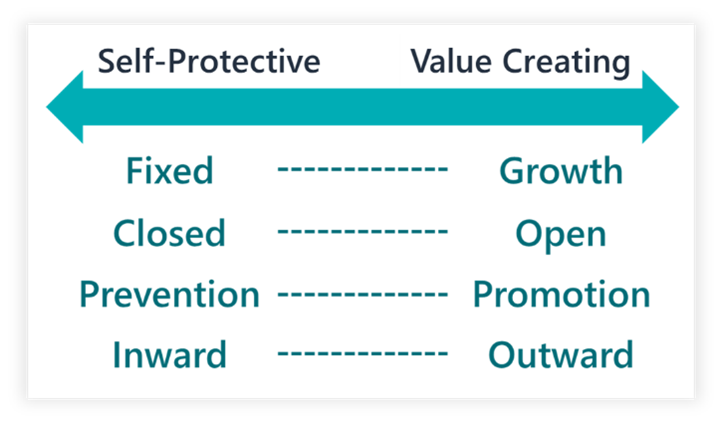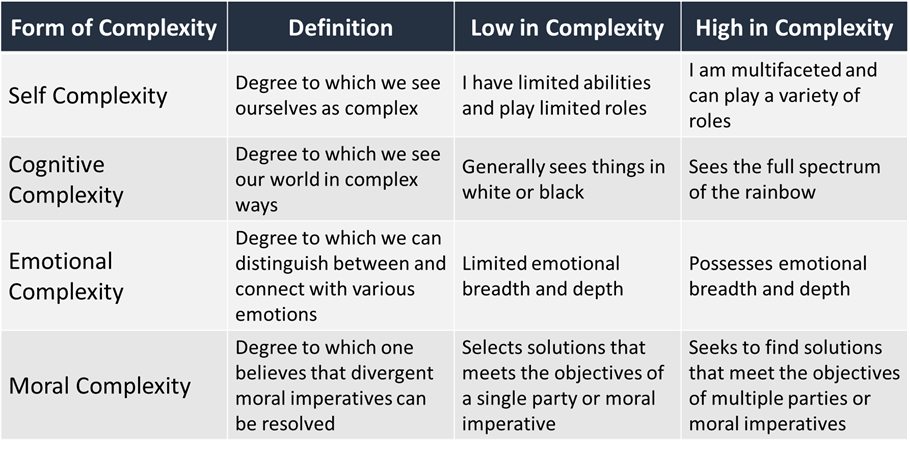What is Vertical Development?
If you are not familiar with vertical development, it is important to understand that we have two sides of ourselves:
- Our Doing Side – The level of our talent, knowledge, skills, & abilities
- Our Being Side – The sophistication of our internal operating system (to what degree is it wired for value creation as opposed to self-protection?)

Horizontal development is improving along our Doing Side.
Vertical development is elevating along our Being Side.
I think one of the biggest hurdles to us engaging in vertical development is that we do not know where to start or what to focus on. The purpose of this article is to provide you with some guidance here.
The Power of Vertical Development
Being a consultant that focuses on vertical development, I have learned the following:
- The more vertically developed we are, the greater our capacity to (1) navigate challenging environments, (2) be a greater positive influence on the world around us, (3) get the most out of our Doing Side talent, knowledge, skills, and abilities.
- We are not yet at the peak for our Being Side altitude. We can all continually elevate ourselves. And, as we do so, we can more fully experience the benefits of 1, 2, and 3 in the point above.
Taking the Next Step in Your Vertical Development Journey
This is great “in theory,” but to make it “real,” we need to get clarity on what we should focus on as our next step in our vertical development journey.
In the rest of this post, I am going to present three frameworks that can be helpful in identifying an aspect of yourself that you need to elevate:
- Mindsets
- Complexity
- Relationships with…
Mindsets
Our mindsets are our mental lenses that cause us to see and interpret our world in more self-protective ways or in more value-creating ways. They are a foundational aspect of our “Being Side.”
As such, they are an ideal aspect of ourselves to inspect to identify an aspect of ourselves that we might want to focus on in our vertical development efforts.
To help with this, I have put together this mindset framework as a composite summary of the last 40+ years of mindset research:

For each of these sets of mindsets, the quality of our mindsets exists somewhere along each continuum. And, it is likely that your internal operating system is more self-protective in one of these areas than the others. If that is the case, and you awaken to it, that gives you a clear area to focus on in your next vertical development journey.
Here are a couple of resources to help you with this:
- Take my FREE Personal Mindset Assessment to awaken to the quality of your mindset
- Check out one of these resources:
Complexity
Something that psychologists have discovered is that people can vary in how complex they are. The simple reality is that some people think and operate in more simple ways, and other people think and operate in more complex ways.
What we have discovered is that people who think and operate in more simple ways operate at a lower Being Side altitude. But, we also have learned that when people vertically develop, and elevate along their Being Side, they begin to think and operate in more complex ways.
The benefit of acknowledging this is that: The more complex we are as a person, the greater our capacity to effectively navigate complex situations.
Another way of saying this is:
- When the complexity of our environment exceeds our personal complexity, we will get stressed out, not think through our challenges effectively, and ultimately flame out or get burned out.
- But, if our personal complexity exceeds the complexity of our environment, we will be able to effectively and appropriately navigate the challenges we face.
Complexity researchers have identified at least four different forms of complexity:

If you want to learn more about these forms of complexity and try to evaluate how complex you are across these forms of complexity, check out these resources:
Relationships With…
One of the most underappreciated aspects of vertical development is the quality of our relationships—not just with people, but with a wide range of experiences, concepts, and internal realities. We all have relationships with things like failure, conflict, time, and power. And these relationships can exist along a continuum: from poor and negative to good and positive.
For example, do you avoid failure at all costs, or do you see it as a necessary part of growth? Do you see time as something you’re constantly battling against, or as an ally in your development? Do you feel empowered by change and feedback, or do you resist them because they feel threatening?
Here is a list of “things” we each have a relationship with:
- Failure
- Conflict
- Time
- Power
- Money
- Locus of Control
- Feedback
- Change
- Learning
- Stress
- Others
- Our Identity
- Our Past
- Our Future
- Ourselves
Each of these relationships contributes to the programming of our internal operating system—our Being Side. If our relationships with these things are more self-protective (e.g., avoiding feedback, fearing failure, distrusting others), they lower our altitude. But if we can rewire these relationships to be more value-creating (e.g., seeing feedback as a gift, embracing learning, accepting our past), we elevate ourselves.
So, I invite you to investigate:
What is the true nature of your relationship with each of these things?
Where you find defensiveness, fear, or resistance, you’ve likely found a vertical development opportunity. Improving the quality of that relationship may be your next best step on your developmental journey.
Final Thoughts
Vertical development is one of the most transformational paths we can take—not just as professionals or leaders, but as people. The more we elevate our internal operating system, the more fully we can show up in challenging situations, add value to those around us, and unlock the potential within our Doing Side.
The three frameworks shared in this article—mindsets, complexity, and our relationships with key aspects of life—are powerful tools to help you better gauge your current vertical altitude. Each one can shine a light on areas where you may still be operating from a self-protective stance, and where intentional development could lead to powerful breakthroughs.
If, in this reflection, you’ve identified a particular area you’d like to elevate—or if you simply want guidance in continuing your vertical development journey—I’d be honored to support you through my one-of-a-kind vertical development coaching process. You can learn more and book a time to connect with me here.


